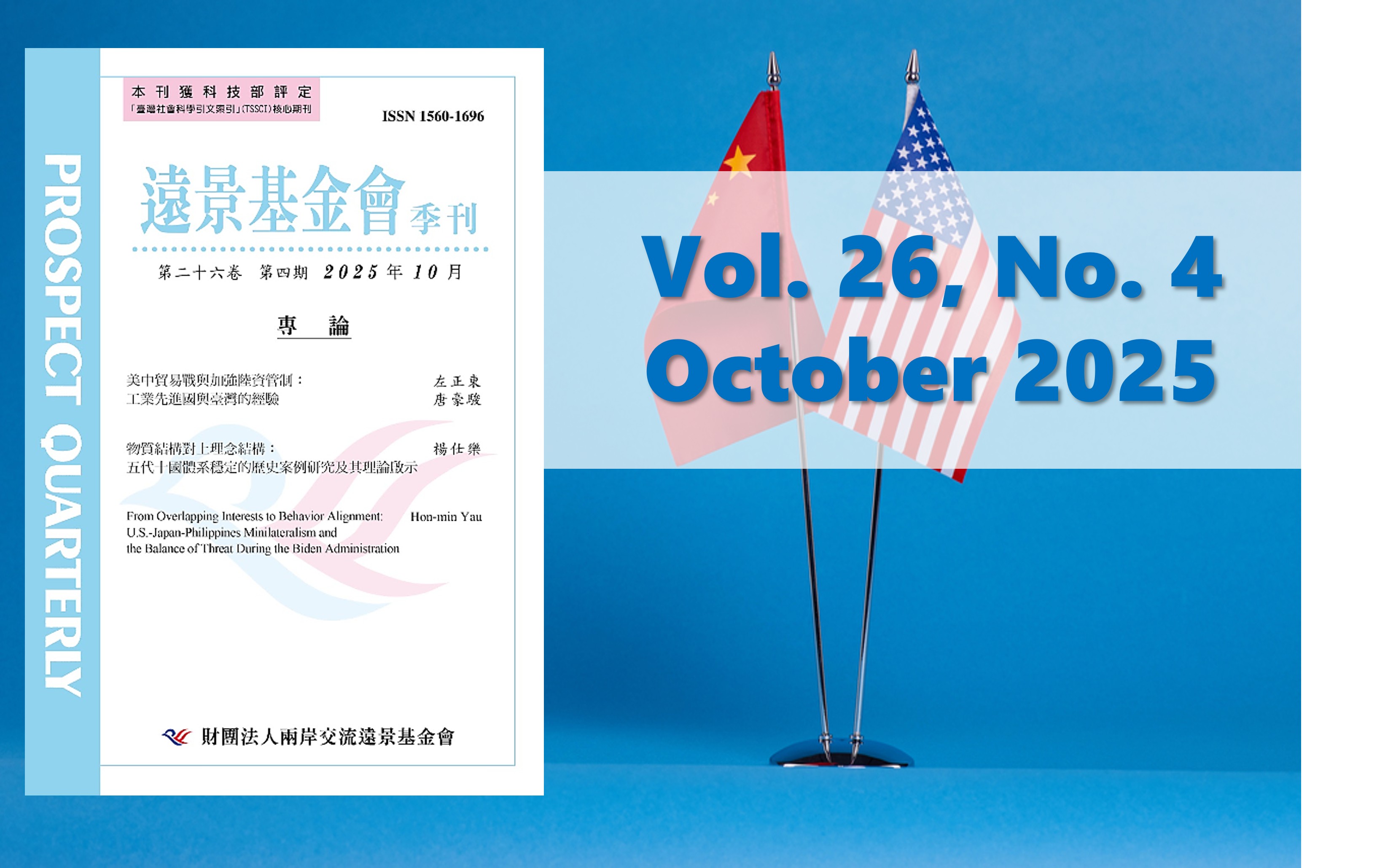遠景基金會季刊第26卷第4期
美中貿易戰與加強陸資管制:
工業先進國與臺灣的經驗
左正東
(臺灣大學政治學系教授)
唐豪駿
(東吳大學政治學系助理教授)
摘 要
面對新冠疫情衝擊全球經濟,各國本應擴大吸引外資,但美、歐、日等先進國家及臺灣反而加強來自中國大陸企業投資的管制。本文先指出歐美等國對待陸資的態度及來自中國大陸投資的特殊性,再釐清先進國家其實從美中貿易戰起便開始以擴大審查範圍、提高審查門檻等方式強化外資審查機制,疫情僅是加速此一發展趨勢。而後,本文探討臺灣對陸資審查機制的建立與變遷,並以近年來大同、淘寶、愛奇藝等三個陸資來臺之個案為例,說明臺灣在陸資相關法規上修法的特色,並以「外來投資可接受臨界點」概念,結合產業特質、投資人特質、外來影響、國內反對等四個因素總結臺灣對陸資政策變化的邏輯,指出臺灣與國際趨勢的相符之處及在制度上的異同。
關鍵詞:外國投資審查、陸資、國家安全、關鍵基礎設施、關鍵技術
物質結構對上理念結構:
五代十國體系穩定的歷史案例研究及其理論啟示
楊仕樂
(國防大學戰略研究所教授)
摘 要
本文嘗試延伸物質與理念結構競爭解釋的經驗證據範疇,以為當代國際關係中對於體系穩定的理論研究產生啟示。接續針對春秋戰國時代的研究之後,本文聚焦在中國史上另一段類似歐洲多國並列的五代十國時期,本文先考察判定期間的物質結構變化,並探究當時流行的主流理念,再對應期間戰爭與和平的起伏,進行競爭性解釋的比對。從中本文發現,導致穩定的物質結構作用壓倒了導致衝突的理念結構作用,兩極體系較穩定的論點,反而在五代十國時期獲得了支持。
關鍵詞:兩極、多極、物質結構、理念結構、五代十國
From Overlapping Interests to Behavior Alignment: U.S.-Japan-Philippines Minilateralism and the Balance of Threat During the Biden Administration
Hon-min Yau
(Associate Professor, Graduate Institute of International Security,
National Defense University)
Abstract
During the Joe Biden administration, the Philippines, Japan, and the U.S. engaged in more frequent and strengthened exchanges from 2023 amid the intensified Sino-U.S. rivalry in the Indo-Pacific. In any strategic competition, the ability to form alliances is a valuable asset, and the emerging U.S.-Japan-Philippines alliance was seen as a reflection of these power dynamics. But why do some states form alliances against particular states in this region? This paper explores this strategic development in the Indo-Pacific political landscape and employs the perspective of the balance of threats in the discipline of International Relations to investigate the following questions. Firstly, given that China has been perceived as an economic powerhouse in Asia, why have Japan and the Philippines shifted away from a hedging posture of maintaining a neutral position, which the small and middle powers in Asia have traditionally welcomed? In addition, while talk of creating a major collective security alliance — a so-called Indo- Pacific NATO — has always been prevalent in Asia, the decision to form, instead, a small-group alliance among the U.S., Japan, and the Philippines, known as minilateralism, also puzzles security observers. Finally, this paper offers some implications and suggestions to security policy-makers relevant to the region. By analytically dissecting the process of the U.S.-Japan-Philippines minilateralism during the Biden administration, this paper hopes to conceptualize possible trends and reflect the developing geopolitical tendencies in the Indo-Pacific.
Keywords: Minilateralism, Choice of Alliance, Balance of Power, Balance of Threats, Indo-Pacific





